















The Himalayan region, pivotal in shaping global climate patterns, remains isolated from national and regional development dialogues. This isolation exacerbates the wide spectrum of challenges the region encounters, including heightened vulnerability to climate change and restricted flow due to its unique topography. Recognizing the need for greater integration, the Himalayan Future Forum (HFF) was established as an incubation center of the Nepal Economic Forum with the aim of harboring multi-faceted dialogues on sustainability, development, and coordination centering Himalayan voices.
HFF 2024 was a two-day flagship event of the Forum that saw participation from diverse stakeholder groups, including government, development partners, private sector, civil society, and academia, from multiple countries. The event focused on stakeholders from Bangladesh, Bhutan, India, and Nepal (BBIN) due to their proximity and vulnerability to the Himalayas. The discussions in HFF 2024 followed three central themes: Climate, Community, and Connectivity. The following is the proceedings from the event’s sessions which include keynote speeches, panel discussions, conversations, and presentations.

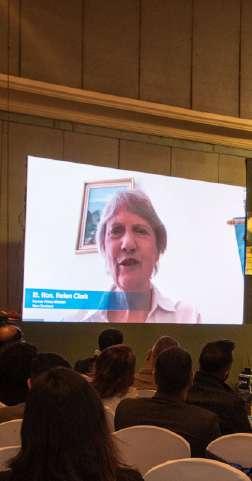


HFF 2024’s opening session set the stage for the two-day event by exploring the various obstacles facing the Himalayan region and the opportunities it presented for development. It introduced the audience to the glaring need for sustainable and inclusive actions and investments in the region, effectively highlighting the key thematic areas of the Forum.



Cecile Fruman underscored the importance of regional integration and cooperation in fostering growth and prosperity, emphasizing the World Bank's dedicated efforts, particularly in South Asia. These efforts include projects aiming to enhance trade and transport connectivity. Cecile also reiterated the bank’s initiatives at encouraging multimodal transport systems in the region, such as waterways and railways, to curb the dependence on road transportation
She stressed that while South Asia is the least integrated region with only 5% of total trade being intra-regional, there have been a lot of positive changes in the past decade itself. Strengthening regional integration, according to the Bank's estimates, could triple trade volume to USD 67 billion and significantly boost member countries' GDP. She noted that trade within the region suffers from non-tariff challenges, which limit its growth and people and community building.
Regional integration is not just an instrument for growth; it is also an instrument for peace.

Additionally, Fruman addressed the vulnerability of the Indo-Gangetic plain to climate change and extreme weather events. She added that such climate change consequences do not follow national boundaries and can affect productivity, GDP, and investment in the region. This underscores the need for a regional network, such as HFF, which can bring stakeholders together to facilitate knowledge sharing, capacity building, and cohesive actions.
New Zealand

Honorable Helen Clarke, in her remarks, underlined the negative effects of climate change on various facets of the world, ranging from communities to natural processes. She stressed that these changes were intensifying and are projected to reach irreversible damage. To combat this, she encouraged redesigning adaptation responses to be more inclusive and to remodel the current view of social and economic transformations.

We had a lot of brainstorming sessions since last year to figure out what could be some of the outcomes of HFF.
The Helen Clark Foundation has published a report on such best practices in community collaboration and engagement. She accentuated the importance of community engagement and bringing together a diverse range of stakeholders by exemplifying a case of the Maketu Iwi Collective, an indigenous collective of a small town. The collective collaborated with the local community and government to develop a climate change adaptation plan Similar to this, she stated that
having more engaging planning and implementation in the Himalayas would allow for the utilization of local and community insights to strengthen natural resource management, food security, and biodiversity.
Hon. Helen Clark also addressed the unique political and geographical complexities of the Himalayan Region, noting that policy-making would require a nuanced approach She urged improving the existing frameworks and crafting policies that are adaptive, inclusive, and responsive to the needs of the region as they evolve.

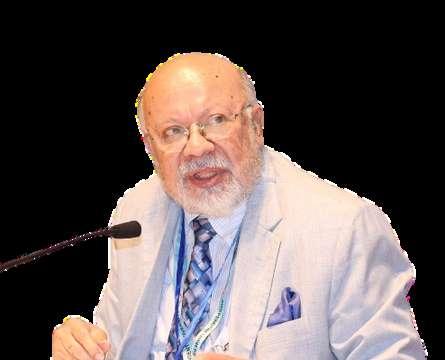

Ambassador Tariq Karim centered his remarks on ‘climate’, stating that he considers it the primus inter pares among the three thematic areas in HFF. He recapitulated certain points from the United Nations Secretary General’s speech to highlight the growing urgency of climate change and its impacts. Futher, he urged leaders to not hesitate any longer to take action.
Ambassador Karim also called attention to the importance of the Hindu Kush Himalayas in climate change dialogues, where glaciers are melting at an unprecedented rate and could lose an alarming 75–80% of their volume by the century-end. He stressed that this could have disastrous implications for many Asian countries through dangerous floods, glacial dams bursting, and ultimately drought. The ice from the Himalayas feeds several major rivers which around two billion people, or a quarter of the world population, depend on.
While many countries, particularly the most vulnerable who contribute the least to carbon emissions, are already working desperately to stave off disaster, they work in silos.
Moreover, Ambassador Karim underlined that climate change is a global issue requiring different actors to work together. He stated that current mitigation and adaptation measures are insufficient whereas the consequences are accelerating, giving the example of 14 butterfly species having disappeared and what it meant for Earth’s greenery He called for a way to move forward together by overcoming deepened partitions and resource nationalism.

Lyonchhen Tshering Tobgay shared insights on Bhutan’s conservation efforts a e leadership and guidance of the country’s enlightened monarchs. He went on to e e environment by legally requiring a forest coverage of at least 60% and declaring over half of their lands as protected areas. This has, in turn, resulted in Bhutan becoming the world’s first carbon-negative country, boasting a forest coverage of over 70% and being one of the few remaining global biodiversity hotspots
Lyonchhen Tobgay also discussed the various climate change-related disasters Bhutan faces despite its dedication to conservation. He made a point on how climate change is a global transboundary issue, and how it disproportionately affects Himalayan lives, livelihoods, and economies. Further, he stressed that to make an effective development in this issue, regional and global cooperation is required. For this, he appreciated HFF 2024’s initiative to bring together diverse Himalayan stakeholders and discuss various concerns from economic development to cultural preservation. He also commended the forum’s emphasis on local and youth inclusion and expressed support for the vision.
It is crucial to engage the youth in our plans as our future rests on their shoulders and our actions today will, in turn, affect theirs.




The Himalayan region has been connected for centuries through social customs and traditions, geographic factors, geopolitics, natural resource management, and trade and economy. The opening plenary discussed the importance of encouraging and strengthening this connectivity and made suggestions on improving intra-regional linkages. The speakers discussed the pivotal role of a supportive policy space for institutions working in the field and the need to overcome geopolitical challenges for effective development efforts aligning with the well-being of the Himalayas.
Sujeev Shakya, moderator of the opening plenary, talked about the bro it can encompass various factors, including physical connectivity and soft power of people-to-people connectivity, which he believes serves connectivity between communities, countries, and regions.
As we are working ahead in the connectivity discourse, the key is to assume that there is going to be geopolitical stress that is going to take place.
Further, he mentioned the evolving role of digitalization in the past 15 to 20 years in boosting connectivity. He encouraged recognizing how technology has built connectivity and increased appreciation for art, culture, literature, and the sharing of knowledge. He honed in on the potential of encouraging connections across the region through stories — a point also brought up by fellow panelist Nyema Zam.
Shakya also stated that there are currently multiple actors working for connectivity, and there is a need to bring them together. Finally, he stated that while geopolitics could create certain issues, stakeholders should not let it disrupt the discourse or the search for opportunities.




Debapriya Bhattacharya spotlighted that, despite the large number of organizations and institutions working for better regional cooperation in South Asia, the region is still divided. He shared his concerns on nation-states maximizing their approaches and geostrategic concerns which have redefined connectivity. He also mentioned the possible challenges such situations could lead to for the balancing act and political and economic behavior of Himalayan countries
Debapriya pointed out that such non-state actors are ideally supposed to fill in the gaps from a disintegrated and disjointed regional cooperation approach. He raised that non-governmental organizations, and organizations working on a nonprofit basis, were unable to do so due to a squeezing policy space within their respective countries. Furthermore, despite having a plethora of successful case studies related to climate, community, and connectivity at the individual or enterprise level, they have not been able to scale up. According to Debapriya, to encourage scalability and realize the collaborative potential, there is a need to have an enabling policy framework.
At the end of the day, it is all about creating an enabling policy environment and having the right institutions to be able to do so.

He mentioned that many organizations are working on regional cooperation in South Asia, which necessitates HFF to distinguish itself and find its own unique space He accentuated the importance of focusing on the granular level through storytelling and bringing together the voices of diverse stakeholders including entrepreneurs, nonstate actors, the private sector, and social movements.

Mahendra P. Lama shared that despite the Himalayas lying at the center of climate change impacts, they are rarely the central point of a discourse on national and international platforms. He emphasized that current discourse tends to marginalize the Himalayas, which possess significant soft power through language, literature, and creativity. He also stressed the need to redefine the model of development in the region accordingly.

We do not want to think about borders as national security threats; it will take us nowhere. Rather, we want to see them as opportunities.
Moreover, Prof Lama stressed the need to rethink how borders and borderlands are looked at and encouraged viewing them as opportunities. He touched upon how the Himalayas used to be an integrated home before it disintegrated to the point of its connectivity projects being displaced. However, he mentioned that the past two decades saw brilliant changes in restoring connectivity and in trade and transport between Bangladesh, Bhutan, India and Nepal.
He also stated that the current model of regional cooperation can be improved. According to him, there is a need to rework the process and start from the bottom up, thereby following a reverse integration model where the community comes first, followed by non-state actors and the private sector. He believes this would allow the space for the preservation and strengthening of Himalayan local knowledge, such as traditional medicine systems, and fashion designs unique to the communities, as a soft power.


Nyema Zam highlighted the power of storytelling to resonate with and unite Himalayan communities, particularly in the context of climate change, a regional concern. Drawing from her background as a digital entrepreneur, she emphasized the effectiveness of documenting efforts through storytelling, as it fosters greater impact and collective engagement.
She also stressed the importance of creating a space for producing local content that connects to the youth and encourages their participation. She discussed that while the youth form a significant proportion of the Himalayan population and are also the next generation, very few of them actively attend seminars and forums, or actively research issues such as climate change. However, they do extensively consume online content, presenting an opportunity to enhance interaction through digital platforms.
Digital connectivity allows us to move beyond borders at just a click of a button.

On the other hand, Nyema Zam also brought up the issue of inadequate local content, the youth gravitating towards global content, and how this contributed to the Himalayan region slowly losing its unique cultures, traditions, values, and even languages. She called for the formation of a digital space that unites filmmakers and content creators from across the region, stating that it had a considerable market given the Himalayan population of 86 million. Further, she underscored the need for supportive policies to foster regional collaboration among creative professionals and film boards across the Himalayas
Visiting Senior Research Fellow
National University of Singapore - Institute of South Asian Studies (NUS-ISAS)

Puspa Sharma, from NUS-ISAS, highlighted the alignment between the Forum's themes and the institute's focus, notably in two key areas: trade and environment, and sustainability and climate. He mentioned the possibility of NUS-ISAS being interested in looking into HFF’s three thematic areas from a Himalayan perspective.
While it is necessary to build infrastructure, we have to be careful to not destroy the ecology, the environment, and add more to climate change.

Sharms expressed support for his fellow panelists’ view that climate change could serve as the anchor in bringing together the Himalayas. He acknowledged the necessity of building physical connectivity networks in the region but cautioned against potential negative impacts on the fragile Himalayan ecosystem. He emphasized the need to analyze how such infrastructure could be built without harming the ecology and the environment of the region
Sharma also mentioned how growing geopolitical challenges could deter the movement towards connectivity, giving the example of the progress in the tripartite energy deal between Nepal, Bangladesh, and India, and possible challenges in its implementation. Further, he expressed concerns about the region's plans to develop hydroelectric infrastructure for renewable energy and connectivity, emphasizing the importance of mitigating ecological damage. He brought up the necessity to establish how the countries’ hydroelectricity sectors would navigate extreme weather events, such as floods and droughts It is crucial to continue discussions and keep the momentum going to be able to come to revelations and conclusions on such pressing matters.


Group Vice President, Supply Chain and Production
Penguin Random House India (PRHI)

Next time you visit a bookstore, make sure to look into FSC certification or 100% recycled logo.
Ajay Joshi stated that sustainability is the need of the hour and it calls for an action. He further mentioned that 40% to 45% of the 15 billion trees cut annually is consumed for paper manufacturing. He stressed that since the paper industry significantly contributed to emissions, pollution, and energy usage, PRHI, being the largest consumer of paper, pledged their responsibility towards sustainability.
Joshi highlighted that PRHI has made their packaging, paper, and warehouse sustainable Catering to the consumer expectations of sustainable and certified products, 90% of their paper is FSC certified. He also said that PRHI is in transition to 100% recycled paper which makes them the first of their kind in India. He clarified that, for packaging to step away from using the plastic fillers in cartons’ void spaces, PRHI uses customized corrugated sleeves. Moreover, he stated how the shift to LED lights from Halogen and use of recycled LDPE sheets have reduced CO2 emission significantly. He also emphasized the elimination of the use of tapes and strapping and conversion to hot glue for sustainability.
Joshi concluded his pledge to sustainability on the note that, through PRHI, books can make the world eco-friendly in addition to making it better

Globally, tourism is transitioning from product-centered to experiential, emphasizing encounters with nature, culture, and intangible heritage. The session aimed to explore the transformation of productdriven tourism in the Himalayas. It advocated for sustainable practices, prioritizing value over volume, and emphasizing the importance of local community benefits from tourism initiatives. By reimagining tourism experiences, the Himalayan region will be able to create more authentic and responsible travel opportunities, benefiting both the environment and the local communities.



Manager - Digital Marketing and Promotions
Nepal Tourism Board
years of extensive experience within the tourism board, reflected on witnessing andscape through its highs and lows. She holds a deep-rooted connection with mperative shift from a product-centric to an experience-centric approach. While d on promoting tangible offerings like hotels and packages, she acknowledged the evolving preferences of modern travelers, especially in the post-COVID era She believed that today's tourists seek immersive and meaningful experiences that transcend conventional sightseeing, prioritizing emotions, personalization, and customization. Shradha actively shared her insights and advocated for strategies aimed at designing personalized and immersive experiences aligned with contemporary traveler expectations and industry norms.
Guiding Questions for the Session:
1.
How have you seen the shift from product to experience in your respective fields and how has it contributed to the overall well-being and satisfaction of the travelers?

2
Could you share your personal success story related to today's topic and include a specific challenge, specific details about what you faced, what strategies you implemented and what was the outcome?
3.
To Amigo - On the client's side, how do you leverage technology to potentially attract a larger crowd and on the producer or farmer's side, how have such initiatives impacted the tea communities at large?
4.
5.
To Deenam - Have you faced any limitations or challenges using the narratives only?
To Janhavi - What are the main challenges for small destinations like India, Nepal, Bhutan, and Bangladesh to cope with the ever-changing trends in tourism?
6
To Sangjay - What strategies would you suggest us to follow to penetrate the luxury market?


Amigo Khadka highlighted the fact that he was there to introduce and market what he called ‘Tea Tourism’. Having come from a product business to creating an experience around it, he shared that he didn’t want to fight for the retail shelf but to create a platform to connect the farmers and producers with the global audiences through their stories and the stories behind the teas. Thus, he started his 10-day-long immersive tours traveling to Illam - the Tea Capital of Nepal As recounted by him, as a part of the tour, he made the guests experience how they cook local cuisines before he immersed them in plucking, withering, rolling, and drying the tea leaves and at the end conducting a blind tea-tasting ceremony to pick out a winner.
Immersive experiences are what the tourists will hold dear and share. These stories will spread in their home countries, hoping to increase tea tourism in ours.
He also emphasized the deep connections the guests build with them along with the locals and the farmers. He expressed that it is a rare chance where the farmers also get to meet and interact with the consumers of the tea they cultivated. Khadka proposed a thought that increased ‘experience tourism’ like this could foster opportunities for youth within those communities, potentially inspiring them to pursue employment locally rather than seeking opportunities abroad.
Further, restated he was there to introduce and market ‘Tea Tourism’ which, according to him, is creating a platform to connect the farmers and the producers with global audiences.


General Manager
Sita Travels Nepal
Deenam Lamichane shared the differences in expectations of the tourists in 2013, when she joined the industry, versus now. The tourists now look for experiences and stories, prompting her company to create a division called ‘Destination Knowledge Center’. The division curated experiences for travelers seeking to get closer to the community and people, different from the conventional sightseeing tours. She believes having relatable stories makes an experience memorable, hence, started incorporating these stories and narratives in the tour packages She also recounted that challenges often arise while trying to convince the tour guides and leaders of the need for the shift to storytelling and immersive experience, as opposed to conventional sightseeing. However, according to her experience, despite the challenges, the guides and leaders have now embraced the unconventional packages and it has now become an integral part of their tour packages.
You need to have the right storytelling when taking your product or experiences to the market.

While storytelling is important, Lamichhane indicated it has two aspects: one storytelling is done when promoting the destination, and the second is done when the traveler arrives at the destination. According to her, both are crucial for an immersive experience.
Hospitality Generalist
Abbotsford Estate India
In the panel discussion, Janhavi Prasada shared her journey of leavin venturing back to her roots in Nainital, taking hold of her 150-year-ol heritage homestay called Abbotsford Estate. As she recounted, sh sustainable ecosystem itself which creates experiences for her guests go on different walks and explore the beauty and familiarize themse reflected on organizing a literature festival called Himalayan Echoes which was created with Prasada starting a small Nainital book club w now developed into a festival attracting hundreds of attendees.
We engage the local communities as well because ultimately it's all about supply and demand. It's a chain. We are all connected by a simple chain.

Further, she noted how, after COVID-19, she has observed that people have come out with a certain aggression towards tourism. This has prompted many to open their hotels and homestays, but this has a greater negative impact on carbon footprint. According to Prasada, people need to plan hotels and homestays well especially in the Himalayas, and prioritize quality over quantity while making it as sustainable as possible and creating lots of experiences.



ground in hotel development and specializing in experience-focused luxury estinations, noted that he believes that the shift from product to experience is him, people nowadays yearn for a more authentic experience because it gives owth, and place. He further reflected that, although travelers’ mindsets are changing, it is still difficult for the owners and stakeholders of hotels to believe that the capital investment should go into the sustainable infrastructure and also the community, that it is more important to reflect the local art and materials into the hotel than bringing in expensive marbles and chandeliers. Moreover, he emphasized how important it is to somehow include the community as well.
Luxury is space, Luxury is time. If you saturate the market with far too many rooms, all you're doing is cannibalizing from each other. And then it's a race to the bottom.

Choegyal also shared his views on how he believes that Nepal is ready for the experiential luxury market, but the country needs the right investments, products, and infrastructure to support this type of tourism. He noted that it is imperative for there to be more incentives and an ease in policies so that foreign operators can work with local partners and local owners would help springboard Nepal as a luxury destination.


Rising global temperatures, exacerbated by climate change, pose significant threats to the Himalayas, impacting biodiversity, economies, lifestyles, and health. In light of these challenges, this session focused on exploring green financing options and opportunities for sustainable growth in the region. Participants engaged in discussions aimed at addressing the adverse effects of climate change and charting a path forward for the Himalayas' diverse climatic zones. The session also aimed to foster dialogue on innovative strategies and collaborative efforts to mitigate climate risks and promote resilience in the region.



Mandakini Kaul, renowned for her insights into climate action and sustainable development, emphasized the magnitude of climate-related challenges facing the region and recounted the staggering statistics shared by experts. Kaul clearly articulated the pressing need for collaborative efforts at both national and regional levels to address these challenges effectively. With a wealth of experience as an analyst at the World Bank, she underscored the imperative of green finance, inclusive development, and real-time investment plans in promoting economic growth while safeguarding the environment. Overall, her reflections on the session highlighted her commitment to fostering partnerships and mobilizing resources to advance climate action across South Asia.
1. To Siddhant – Explain the green growth landscape in Nepal and South Asia, including the works on the ground, the opportunities, lessons, and barriers And, how do we convince corporations of the importance of green growth on the ground? Share some experience from the ground.
3.
To Teresa – Establish a broader context for Himalayan countries to collaborate, harness cooperation, and promote green growth. Also, share the IMF’s thoughts on climate finance, and the difference between the global and South Asian trends in green finance.
2. To Rinchen – What are the risks and trade-offs of the green growth approach and how can it be managed? And, how can private companies and financial institutions factor Environmental, Social, and Governance into the decision-making process?
During the session, Rinchen Choegyal stressed the importan investments, given the amount of environmental challenges. that there is an urgency to reduce carbon emissions by 45% b However, he noted that a large amount of capital is required fo with Asia being the epicenter of greenhouse gas emissions an challenges to attract the necessary capital to transition to gre according to him, private capital and investment can be of gre he shared that investing is also evolving in the sense that returns but also the environmental, social, and governmental impact. He believed that is where the term ESG (Environment and Social and Governance standards) started, and now the term is becoming mainstream.
Financial institutions have to integrate ESG in a way which is not just greenwashing. We need to implement ESG in a way that is meaningful.

Considering the mentioned points, he further explained how his company, Robeco, has been implementing ESG in which having a negative screening program, a bottom-up approach, and an investment framework using existing data and inhouse research is very important. Overall, he expressed the potential of ESG principles in fostering investments in sustainable alternatives.




As part of the discussion, Siddhant Panday highlighted Nepal's lag in Green Financing, attributing it to the absence of cohesive policies supporting green initiatives and innovations. In his view, the global landscape is evolving amidst climate change and environmental crises, necessitating not only grants but also innovative financial mechanisms. He stressed that bringing transformative change would prove challenging and costly.
Panday proved his point by recounting his attempt to export bio pellets to India and subsequently encountering a 200% export duty He questioned the rationale behind such a high duty, especially considering that plywood from which the pellets were made, incurred no export duty. His inquiries revealed an old taxation framework that failed to align with contemporary green innovations. Further, his anecdote highlighted the discrepancy between growing green technologies and outdated policies. Finally, he also warned that, without policy revisions, Nepal's sustainability and green growth initiatives would suffer severe setbacks in the future.
The world is looking for innovative financial instruments. Now we need to start thinking along those lines to be able to attract the green bonds.

Among the various things she discussed, Teresa Daban Sanchez firstly shared that South Asia as a region is one of the higher contributors to carbon emissions. Consequently, she not only stressed the importance of growing on a green basis but also revealed a major obstacle for growth – Geo-economics. Geo-economics, in her opinion, has become a major concern with countries taking part in protectionism to defend themselves in order to acquire energy security by restricting import and export She further added that this has become a concern, especially in countries in which the government has limitations due to their debt levels, which is why attracting the private sector is very important. For the private sector to come into the limelight and the obstacles to be resolved, she noted that there must be better cooperation between the countries. She also mentioned that coordination, in terms of taxation, and the idea of trading a carbon credit among countries could reduce carbon emissions by a lot.
Issues of climate change go beyond borders. So collective actions, coordination, and cooperation is essential to grow on a green basis.

Sanchez further highlighted the crucial role of the International Monetary Fund (IMF) to provide technical assistance, alongside other international financial institutions like the World Bank, in order to ensure effective budgeting and financing for climate-related projects. Additionally, she shed light on the fact that the IMF has established the Resilient Sustainability Trust that leverages Special Drawing Rights (SDR) allocations from advanced countries to provide low-income nations with climate-focused financing.
 IMF Resident Representative to Nepal, Asia Pacific Department - Division 1
IMF Resident Representative to Nepal, Asia Pacific Department - Division 1


Talking about the ambitious GRID platform launched in Nepal to address various interconnected challenges such as climate change, food insecurity, debt distress, and pandemics, this session aimed to coordinate efforts to enhance resilience and inclusivity in development. GRID has involved nearly all government ministries and 16 development partners and, over the next decade, the GRID platform plans to focus on scaling up action across ten priority transitions, supported by financing from existing portfolios, active pipelines, and potential new multipartner investment programs. The session iterated on the organizations’ focus on people, prosperity, planet and also added a profitability dimension in regards to GRID. The session also attested that, through ongoing policy reforms and government budget allocations, Nepal has signaled a shift towards a sustainable development model with integration across different sectors.

In his presentation, Stephen Danyo highlighted Nepal's emphasis on scale and sustainability, underscoring its importance for people, prosperity, and the planet. He ]outlined collaborative efforts among 16 development partners, the Nepali government, and stakeholders, over the past three years, aimed at advancing green, resilient, and inclusive development. While acknowledging the current policy and investment initiatives, he emphasized the need to leverage Nepal's substantial development achievements as a springboard for further advancement
Further, he delved into Nepal's notable progress and challenges, citing achievements like expanded forest cover, successful malaria control, high COVID vaccination rates, and improved electricity access. However, despite mentioning Nepal’s resilience post-earthquake and in terms of poverty reduction, he cautioned against complacency, pointing to looming challenges such as the poly-crisis that the world faces which includes climate change, environmental hazards, and fiscal challenges threatening Nepal's development.
All finance should be climate finance. Everything we invest in, everything you invest in, should be climate finance.

Besides this, Danyo advocated for a holistic development approach integrating sustainability, resilience, and inclusivity. He also stated the Grid Action Plan as a strategic roadmap for Nepal's future development, emphasizing the prioritization of investments aligned with these fundamental principles. Finally, he attested to adding the profitability dimension, acknowledging its importance for sustenance of any company.


scale and sustainability challenges amid climate change, aiming for netnderlined the importance of financial viability for green projects. As an to shift from LPG to biogas, as well as noting disparities in government rganic ones.
The challenge that I have seen is about financing, not getting subsidies or climate change. It’s probably more about how to level the playing fields and how can we make green projects bankable.

Moreover, he discussed specific projects on biogas production and solar farms as avenues for emission reduction, contrasting them with climate risks owing to traditional hydropower. He also advocated for circular economy principles like aquaponics and climate-resilient farming to bolster resilience and economic growth in agriculture.
Lastly, he envisioned accelerated progress toward a low-carbon economy through initiatives like the Grid Action Plan. He emphasized inclusive climate action, calling for comprehensive impact assessments and a renewed focus on circular economy principles to ensure resilience. He also envisioned Nepal's transition towards a sustainable future driven by innovative solutions and collective efforts, prioritizing climate resilience and inclusive growth.
Aloi Private Ltd.

Sonika Manandhar, aligning her work with the discussed themes, proposed integrating profit into the conventional sustainability framework. She stressed profitability's role in propelling sustainable endeavors, detailing her experience in bolstering trust among green grassroots entrepreneurs, particularly in agriculture and electric transportation. She stated that, through efforts focused on digital inclusion and trust-building, she could enhance accessibility and transparency in green investments
Since the center of my work relies on profitability we could make it 4Ps: people, planet, profit then prosperity. Without profit there isn’t a win-win for any parties.

She also pointed out specific hurdles and prospects, spotlighting the challenges micro-entrepreneurs face in securing financing for scaling, notably in the electric vehicle sector. Further, she stressed on the profit potential of green financing, advocating for subsidies to mitigate risk in adopting greener technologies. Additionally, she also featured the value of partnerships, citing collaborations like Mutha's hydroponic initiatives for climate-resilient dairy farming
In her closing remarks, she stressed the urgency of addressing trust gaps, promoting financial inclusivity, and fostering market linkages to ensure the viability and expansibility of climate-smart ventures. She pinpointed climate-resilient agriculture and sustainable transportation as focal points, acknowledging the disproportionate impact of transition challenges on marginalized communities. Finally, she called for concerted efforts to advance sustainable development and combat climate change, emphasizing an all-encompassing strategy prioritizing inclusivity and collaboration.


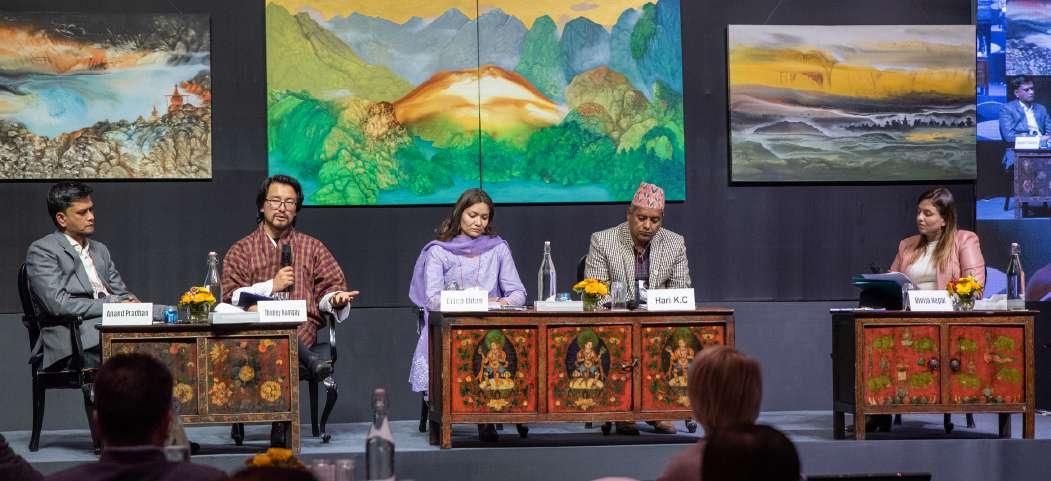
The session aimed to explore sustainable agriculture initiatives in the Himalayan region, particularly focusing on the challenges aggravated by climate change GIZ Nepal's GRAPE project, Ramalaya Farm in Sikkim and Druk Metho in Bhutan served as case studies. The session featured an approach of engaging various stakeholders across economic governance, action research, rolling-out, and scaling-up efforts to strengthen the agricultural ecosystem. It provided a platform for agricultural experts from different Himalayan countries to discuss the adaptability of such programs and explore additional strategies for sustainable agriculture. Through collaborative discussions, the panelists, representing different businesses, contributed insights and solutions to address the unique challenges faced by the region's agricultural sector amidst changing environmental conditions. The session highlights included increasing marketing, propelling translation of research and experiments into action, personalized support with focus on sustainability.

The moderator, Binija Nepal, began the session by stressing the need to shift towards more sustainable agroecological methods emphasizing nature-based solutions; eco-friendly approaches; and natural farming. She brought to light the escalated use of chemicals and pesticides used for food production which has helped address hunger challenges but at the cost of the environment. To talk about the sustainable agro-ecology approaches implemented by companies in the Himalayan region, she presented some guiding questions as listed below
Could you say a few lines about your business and what kind of agro-ecological practices are being implemented there in terms of sustainability?
How do you think we can foster effective collaboration between education, research, and extension services to promote and advance agro-ecology and how can research be effectively translated into practical?
Specifically, in the context of Nepal, what are the gaps within the existing policies to support agro-ecological approaches? Also, specify the connection of extension services with different knots of the value chain. Highlight on what are the provisions in your country or state for extension services to ensure accessibility

 Programme Component Manager
Programme Component Manager


Having started the Ramalaya Farm in 2018, Anand Pradhan shared his insights into the six-year journey of specializing in fresh produce and adhering to agro-ecological practices. Emphasizing soil health, no-dig farming, and weather patterns, he highlighted the importance of mulching for insecticide-free soil beds and the challenges of unpredictable weather. As an example, he talked about how the trees in his area would be thriving, while the same trees could be dead 10 minutes from his place, and therefore how paramount caution is in production
Reflecting on the agricultural challenges in the Indian landscape, he underscored issues with extension services, despite financial assistance from organizations like NABARD. He pointed out that there is a heavy reliance on mono-cropping and further identified a gap between farmer’s needs and the assistance provided by the Sikkim government. He then went on to emphasize the need for immediate and personalized extension services as per farmers’ unique needs and diverse produce as right now, they rely mostly on assistance through word-of-mouth practices and social media. In addressing these challenges, he also called for increased marketing and collaboration between farmers and government officials, that should aim to bridge the gap immediately and propel sustainable agriculture forward.
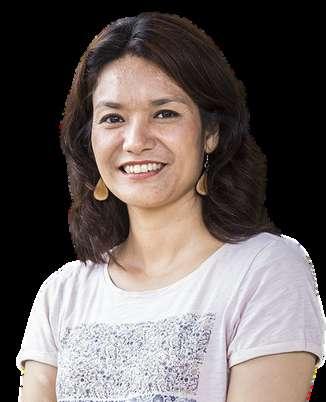
Erica, Udas with her background in knowledge organization and involvement project, advocated for the comprehensive integration of climate change into e services. She emphasized the urgency of aligning education curriculum with contemporary agro-ecological themes, focusing on climate change, soil health, and water efficiency. The GRAPE project, according to her, served as a practical example that showcased collaboration between universities and farmers in real-world settings, illustrating the translation of research findings into educational systems.
All the regions have similarity in terms of ecology, climate and environment and therefore contextualization is important to understand each social and economic settings.

Furthermore, she also advocated for the establishment of knowledge parks at grassroot levels to facilitate knowledge exchange as well as peer-to-peer learning between farmers. She stressed the need to leverage private sector involvement for agro-advisory services to complement government extension efforts Additionally, she commended the multi-stakeholder approach undertaken by Karnali and Sudurpaschim provinces and noted that it holds potential for replication for advanced agro-ecology in the agricultural landscape.
Finally, she concluded by underscoring the need for holistic integration of climate change considerations into various aspects of agriculture. The proposed strategies, including curriculum alignment, knowledge parks, and private sector collaboration, offered a comprehensive approach to foster sustainable practices and ensure the successful dissemination of knowledge in agro-ecological systems


Director General
Department of Agriculture, Government of Nepal
During the session, Hari Bahadur KC provided insights into the agricultural policy evolution in Nepal since 1990, pointing out the shift from commercial to ecologically focused policies. He emphasized key initiatives like the National Agriculture Policy and integrated pest management, acknowledging recent challenges that revealed gaps in resilience, preparedness, and agro-ecological practices. He also raised the need for policy differentiation for farmers who lack customized support and called out the imbalance in promoting both chemical and non-chemical agriculture, calling for a sustainable balance.
KC, as a representative of the Nepali government, addressed the policy strengths by elucidating the collaborative efforts of the Government with the Department of Hydrology and Meteorology on agro-ecological measures. He identified the policy gaps and identified coordination challenges after federalization, as well as institutional gaps in the extension system, research, education and the value chain. He also highlighted the limited market access for nature-based solutions and reliance on traditional chemicals. He mentioned that the shift to organic farming revealed capacity gaps in knowledge and skills for extension personnel and farmers. Further, he noted that
We easily advocate against the use of harmful chemicals to the farmers but we cannot recommend alternatives to such chemicals which then brings us back to chemical fertilizers.

organic farming faced post-production challenges like lack of marketing, certification, and trade promotion, despite the growing demand for organic products.
Moving forward, he called for improved coordination, immediate policy adjustments, personalized support, capacity building, and market access in order to create a holistic approach to advance Nepal's agricultural sector
Thinley Namgay, who works closely with farmers in rural farming com explaining that his company, Bhutan Blossoms, produces, manufactures, the local market and export. Talking about the ecological aspects, he p experience such as how Bhutan Blossoms addressed rice mono-croppin promote soil health and countered global warming by encouraging tre runoff, and ensuring soil nutrient retention during heavy monsoons.

He also mentioned that his organization has implemented HACCP, ISO certifications, and some local certifications to ensure product quality. Further, he shared his experience in establishing the first EU organic certified farm in Bhutan aligning with Bhutan's goal to go organic, focusing on sustainable packaging solutions. In terms of market competitiveness, he pointed out that the company focuses more on communicating their strong environmental values more than selling the product He also talked about their radical business model where 20% of the company profit is given back to farmers they’re working with and another 205 to farming communities.
Druk has ISO certifications as well as local certifications to ensure good hygiene and management practices.

He concluded by stating that they have been using this storytelling to market their products because, despite the talks about sustainability, there is nothing without a market. Therefore, his organization is focusing on niche tourism markets, expanding, and collaborating globally.


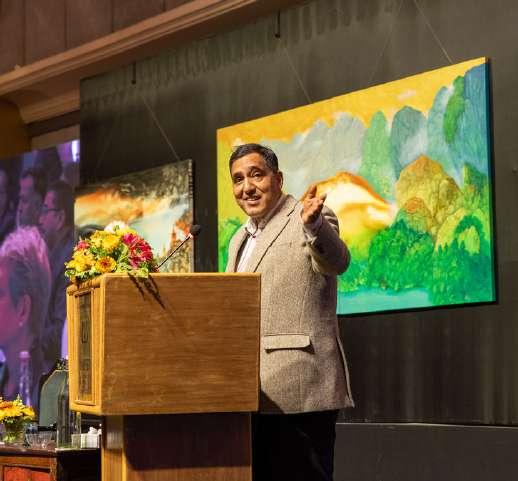
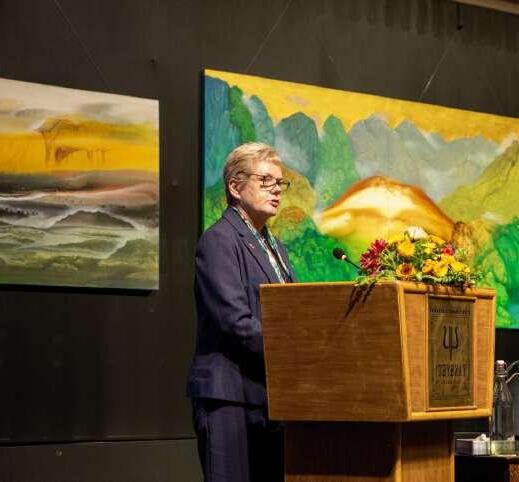
Following the first day of the HFF 2024 session, the Opening Session on Day 2 set the tone for the forum by featuring esteemed speakers who further illuminated the theme and objectives of climate, connectivity and community. The session enunciated the importance of dialogue platforms like HFF over structured discussion and youth involvement for a collectively empowering future of Himalayan region. It also included uncovering the vast potential that lies in Himalayan region. Further both speakers focused on erasing the knowledge or implementation gap on the grassroot level and advocated for an inclusive democracy. Finally the session highlighted the urgent need for addressing climate change since the consequences are evident and mostly acute at the Himalayan region.

Hari Sharma began his speech by acknowledging the importance of reflecting on the past and present to envision the future of the Himalayas. He expressed concern about the prevailing perception of nature as an invincible entity and emphasized the need to bridge the gap between scientific knowledge and the local communities facing environmental challenges. He also highlighted the rapid depletion of glacier reserves within a short period, stating the urgency to address environmental devastation Further, he appreciated the forum’s effort to include young participants, recognizing the youths’ pivotal role in shaping the region's future.
Moreover, Sharma delved into the inherent tension between new possibilities and traditional approaches, particularly in South Asia and advocated for contentious conversations and peaceful contests, needed for an inclusive democracy. He stated that democracy was indispensable for the region's future, and emphasized the need for diverse voices, deliberation, and accountability. He also pointed out the critical role of connectivity and framed it as a fluid conversation rather than merely the sanitized, digitized exchange that it usually is.

Although there is a general understanding about green investment, its biggest challenge is to connect people on the ground with scientific knowledge and temperament.
Sharma concluded his speech by urging the Himalayan Future Forum to embrace diverse perspectives and foster meaningful conversations among stakeholders. Finally, he enunciated the importance of dialogue over structured discussions, envisioning a future where different voices contribute to a collective understanding of the challenges and possibilities in the Himalayan region.
 Executive Director
Executive Director


g the organizers and pinned the significance of l partnerships. She stressed on the pivotal role of sperity and stability in the Himalayan region and shared challenges in the area, and featured the need for cooperation
Ambassador Dramdal further talked about the issue of climate change and its acute impact on the Himalayan region. She noted that collective action is needed to address climate change and enhance sustainable resource management. Drawing from Norway's experience, she outlined Norway's historical development of hydropower in three phases and highlighted their ongoing commitment to supporting Nepal's renewable energy initiatives. Moreover, while discussing the South Asian electricity sector, she iterated Nepal’s opportunities as a hydro-rich nation for regional market engagement. She also addressed the ongoing challenges in Nepal's energy sector such as the need for infrastructure development, institutional capacity building, and private sector involvement.
Climate change, although a global problem, has particularly acute immediate consequences in the Himalayan region.
Ambassador Dramdal concluded her remarks by calling out the significance of regional cooperation in the Himalayan region. She enunciated that there are many potential gains of acting collectively, envisioning a resilient and prosperous region. Finally, she expressed hope that the Himalayan Future Forum (HFF) would be pivotal in guiding the region toward this vision


Much like the interconnected elements of energy production, distribution, and consumption in the Himalayas, the post-colonial era has established platforms for local and indigenous knowledge systems to thrive, presenting economic opportunities for local communities. In this regard, the session discussed the promotion of indigenous knowledge of the Himalayan region across various sectors, from combating climate change to facilitating spiritual healing. This session brought together organizations and individuals engaged with local or indigenous knowledge, providing them a platform to share their perspectives and goals Just as discussions on the Himalayan energy landscape are vital for shaping a sustainable future, this session provided insights on laying the groundwork for harnessing indigenous knowledge while adhering to principles of sustainability and empowerment.


Founder and CEO
Herveda Botanicals Pvt. Ltd.

ned the session by sharing her experience of learning about Himalayan knowledge and discovering a part of her identity which was lying out there in Mustang. As a returnee with a PhD in chemistry, she shared how she was ashamed to not know about Amchi and Sowa Rigpa even though she had read books on Ayurveda, which prompted her to dedicate a decade in research of medicinal plants, indigenous knowledge and bringing those knowledge in the form of stories and products in the market Panday also highlighted the need to learn from India and China as they have been doing a lot to have their own standardizing techniques and methodologies in showing their efficacy. To discuss about indigenous knowledge and its preservation, she presented the following guiding questions.
1.
To Anushka Shrestha - Amidst youth migration and declining traditional businesses, you've returned to Nepal to revitalize indigenous knowledge-based enterprises like Makkuse, collaborating closely with your community. What prompted this decision, and what measures are vital for sustainable growth? Additionally, how can we foster collaboration among these enterprises domestically and internationally to achieve global recognition?
2.
To Marie-Caroline Pons - As a long-time advocate of indigenous knowledge in Nepal, could you elaborate on the vital role of language in preserving and leveraging such wisdom? Additionally, could you highlight some of the captivating community initiatives you've spearheaded, and how the concept of giving back extends beyond language into other domains?
3.
To Tshering Tenzin - Could you enlighten us on your company's journey harnessing Himalayan herbs and indigenous wisdom, involving the government and community? Additionally, how does your company give back to the community and approach traditional medicines across nations?


Anushka Shrestha started off by highlighting how she returne capacity building and capability development, which came to how she does not come from a family of business owners ground up seemed like a challenging path, but she realize toward While recounting her experiences, she highlighted ho pasted over every problem of Nepal, while instead there need y p larger problem.
It has to be the community that takes the indigenous knowledge forward, not as a CSR act but because it is necessary, commercially viable, and good for the world that we live in.
Shrestha further discussed that there is a general apprehension towards the word “outsiders”. Whereas, she believes, outside perspective is absolutely necessary, highlighting the fact that as a Newar, she did not realize the importance of the indigenous knowledge and identity because it came too easy to her. She also noted that one of the biggest hindrances in expanding indigenous knowledge globally is the technical aspect of it, which raises the need for formalization of knowledge. Talking about indigenous knowledge, she put forward how producers shy away from promoting things as indigenous because it might be considered to be exotic and not very commercially viable. But owning up to that identity would actually help in breaking through that ceiling of being indigenous yet dependable and trustable.



During the session, Marie-Caroline Pons reflected on her experience working in the linguistics of indigenous Nepali languages, starting with when she came to Nepal about 20 years ago. When she came, she was struck with the language diversity in the country which prompted her to pursue her career in linguistics and thereafter worked on three different indigenous languages of Magar, Rautes, and Chepang. While working on these languages, she highlighted how she wanted to implement a model that is highly collaborative She noted how, for the documentation and the description of the Chepang project that she has been working on for the last six years, she witnessed the lack of a writing system. The natives had to struggle writing down their own language using the available scripts, as their language had extra consonants which were not available on the Roman or Devanagri scripts.
Language embodies the knowledge of the people. Knowledge is integrated with the structure of the language, the formation of the words, and even in the grammatical features.
Believing that anyone can understand her drive to save the languages if only there was a way to transmit the knowledge, she trained the members of Chepang society in the understanding of the phonology of their language so that they could transcribe any recording in the phonetic alphabet. She underscored how the trained individuals have now become really independent even though most of them were agriculturalists who did not have any
form of education and had never even touched a computer. Finally, she concluded by emphasizing the need to preserve indigenous languages.

In the session, Tshering Tenzin discussed the operations of his company, Menjong Soring Pharmaceuticals, which is owned by the government but is managed independently. He highlighted how traditional Bhutanese medicine actually originated in Tibet even before Bhutan was not yet into modernization. He also talked about Sowa-Rigpa, which is actually the oldest surviving and most well-documented medicinal tradition, but is hardly recognized and known to others

That is why we need to connect and work together between countries. We could make use of the modern technologies and even Artificial Intelligence to bridge the knowledge gap.
He then went on to describe how medical services in Bhutan include both traditional and modern medicine and that people have the right of choice between going to hospitals or opting for traditional medicine, something that is also ingrained in Bhutan’s constitution. Additionally, he sharing interesting information about how the national biodiversity center in Bhutan, which looks after all the herbs and plants, has a system of benefit sharing whereby they have to share 5% of the profit with the community.
Besides this, he raised the issue of how there is less attention to traditional medicines and herbs due to the lack of statistics around their effects. He added on to the issue by stating that the manufacturing of traditional medicines has gone down as the budget is not rolled out enough since the government, too, has issues in showing the health impacts of traditional herbs.
 Menjong Sorig Pharmaceuticals Corporation Limited
Menjong Sorig Pharmaceuticals Corporation Limited

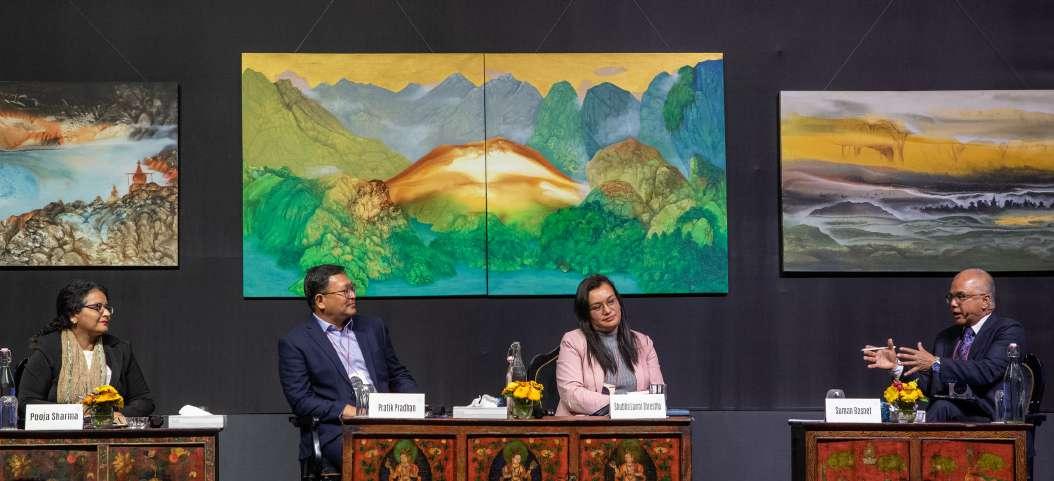
The session revolved around the exploration of the Himalayan energy ecosystem, which involved understanding the interconnected elements of energy production, distribution, and consumption. Presenting a unique potential for sustainable development, the region's distinct natural topography and abundant renewable energy resources was discussed. The session further involved exchanges that unraveled the complexities and opportunities ingrained within the Himalayan energy landscape, which is imperative in shaping a resilient and sustainable future. This session also facilitated dialogue aiming to lay the groundwork for a future where the energy ecosystem is efficiently harnessed while upholding the principles of sustainability.


Suman Basnet, the moderator, started by describing the energy mix and how the range of natural resources used to derive energy can be an effective means of understanding the energy ecosystem of a region or a country. He raised the need to have an efficient and sustainable energy ecosystem by shifting from dependence on fossil fuels and moving towards clean, renewable, and indigenous energy sources, like hydropower, solar, and renewable biomass Further, he put forward the idea of using Nepal as a case study to discuss the relevant issues that could be extrapolated to other countries in the Himalayan region. He framed the session by posing several guiding questions listed below.
1. To Pratik Pradhan - How can we strategically navigate the seasonal variations of run-of-river hydropower plants and the heightened impacts of climate change on energy production in Nepal? Additionally, can we harness the significant solar energy potential to bolster hydropower output and enhance energy system resilience? Furthermore, amidst debates on electricity export versus domestic consumption, is there a pathway to create a mutually beneficial scenario, enabling energy trade while fostering domestic development?
3.
To Pooja Sharma - Transitioning to clean cooking involves not only technical but also social and economic aspects. How can we effectively facilitate this transition? Additionally, in energy transition efforts, particularly in developing countries like Nepal, achieving energy justice is crucial. How can we ensure equitable distribution of benefits, burdens, and decision-making in energy production and consumption?
2. To Shubha Laxmi Shrestha - As the government explores strategies to transition from non-electric to electricity-based energy use and enhance energy consumption, what key factors should it prioritize in drafting these strategies? Furthermore, how can energy efficiency bolster the resilience of our energy system, and what immediate actions are paramount in this regard?
 Team Leader
Team Leader

Country Director Practical Action - Nepal

by talking about the transition towards clean cooking as an efficient at the transition to clean cooking is not as difficult as it may seem, opulation of Nepal still rely on traditional fuels. She advocated for q stment, stating that members of the community are unaware of the efficiency of electric cooking or use and the high yield of biomass Thus, she highlighted that investment is needed not only in enterprise, electricity, or infrastructure sectors but also in demand stimulation. Focusing on the affordability of clean energy, she further underscored the need for a tailored market mechanism approach rather than a blanket approach for subsidy and incentive schemes.
Sharma also described the need for a local and just energy transition platform where all the affected stakeholders in the process are included and engaged. She noted the importance of practical action, more than the need for investment, stating that the transition should not only benefit people but also address the negative impact it may have on them. As an example, she talked about a business model that catered induction cooktops to 10,000 households for people in remote locations. Lastly, she delved into having a multi-pronged approach to make sure that there is investment, and that it is affordable, and prompts a behavior change.
Now is the time to go to the communities, invest in demand stimulation, talk about issues, have more conversations with the stakeholders in the communities, and then bridge the gap of trust.

Pratik Pradhan, started off the session by suggesting having multiple ways to generate electricity from hydropower to ensure good planning. He provided insight into the mechanisms of run-of-river hydropower projects, thereby highlighting its limitations on generating electricity due to the lack of energy storage capacity. He illustrated the transition of 10-15 years to peak run-of-river time as the run-of river project is not able to meet the target capacity Further, to tackle the effects of climate change, he put forward solutions such as conducting smaller-scale simulations of the dams and projects to model flows or even landslides that the river has never experienced in its lifetime. This would also inform the lenders regarding associated risks.
As most of the consumption in Nepal has been for domestic use, there hasn't been any energyintensive industries. Without it, there’s not going to be an increase in domestic demand.

Moreover, he elucidated how the Government of Nepal is instituting commendable regulations by opening up Purchase Power Agreements (PPAs) up to 10 MW without restrictions, indicating a change in the energy situation in the country. Further, he proposed to balance the demand for electricity in the drier season by using domestic solar energy and reducing the import of electricity from India Finally, he emphasized the need to have an early warning system upstream to be aware of the trigger of big floods and ensure the continuation of the dam within a month.



Assistant Director
on Nepal’s ambition to achieve net zero emission by 2045, stated that the y relevant for Nepal, considering that Nepal is among the 10 most vulnerable he discussed that a massive investment is needed in transmission and distribution systems to transition from non-electric to electric resources. She also advocated that the government should invest in research and development, facilitate public-private partnerships, streamline the regulatory framework, create policy coherence, and accelerate the deployment of clean energy infrastructure throughout Nepal.
Moreover, Shrestha highlighted that, although Nepal started the journey of energy efficiency in 1985 through the initiation of awareness creation and energy audits for industries, it is still in the crawling stage. Thus, she emphasized that there is a need to organize outreach campaigns and workshops along with educational initiatives, thereby building a culture of sustainability for Nepal to transition from LPG. Finally, she shared that the Alternative Energy Promotion Center is working for the Renewable Energy and Energy Efficiency Act which would drive the diversification of not only big hydropower plants but also small hydropower and other renewable technologies.
In the context of energy efficiency, it is important to highlight that one unit of energy saved is more than a unit of energy that is generated.


The Himalayan region has been disproportionately affected by climate change-induced disasters. However, currently, there is minimal adoption and availability of climate insurance in the region. In this context, the session on insurance and resilience explored the importance and relevance of climate insurance in South Asia. This session discussed insurance's role in mitigating the region's multi-faceted challenges. The session also delved into the innovative insurance products and services that can help protect lives and property vulnerable to catastrophic events. Additionally, the discussion explored how insurance could shield vital properties and livelihoods in climate-vulnerable areas like the Himalayas.



ialogue by addressing the ongoing climate change challenges in the conversation towards addressing issues and solutions at the of insurance. Transitioning to the industry viewpoint, he explored and leveraged technology to enhance accessibility, fairness, and delved into the concept of parametric insurance, discussing its effects on marginalized and vulnerable communities. Finally, he moved on to frame the discussion using the guiding questions listed below, covering topics like insurance claims management during a disaster and embedding insurance into digital wallets.
What exactly is happening when it comes to climate change in South Asia? What are the stories about communities on what is currently happening in the region?
As technology has expanded so much, what solutions can emerge from the insurance sector?
How is the intersection of climate change and insurance in South Asia now?
How do we leverage technology insurance inclusive and affordable in terms of access and availability?
Where do climate change, governance, and policymaking tune into communicating with vulnerable communities?
How do you see insurance in resolving issues of animal harm to human properties?
How is the intersection of climate and financial services in Nepal?
From an industry perspective, how do you see emerging issues in the insurance industry considering climate change?

Mahendra K Shrestha, the Chairman of Himalayan Everest Insurance, set the stage for the session with introductory remarks, advocating on the crucial role of insurance in safeguarding communities and the economy. He pointed out that its importance is even more considering escalating challenges faced by the Himalayas due to the increasing frequency and intensity of extreme weather events.
In the Himalayan context, where vulnerable populations often bear the brunt of environmental degradation and resource depletion, ensuring equitable access to insurance is paramount.
Expressing insurance as a cornerstone of risk management, Shrestha provided insights on its importance in ensuring financial security for individuals, businesses, and governments to bounce back and fortify resilience post-disaster. Moreover, he called for climate insurance to be accessible, cost-effective, and tailored to the diverse requirements of Himalayan communities
He also emphasized the need for a fusion of technology, environmental awareness, and grassroot engagement, as evidenced by the diverse expertise represented on the panel. Finally, he expressed hope that the panel discussion would contribute to a deeper understanding of the issue at hand.

 Chair
Chair

Executive Director & Chief Business Officer
Salasar Services Pvt Ltd
D hary stressed that climate change is a pressing global concern that affects e th Asia particularly vulnerable. He further mentioned that the effects are felt at b in the region. On the macro level, climate change negatively impacts large corporations like hydropower due to natural disasters that are worsened by global warming. Whereas, on the micro level, it impacts the individuals from marginalized communities as they are exposed to loss of lives and livelihoods. He acknowledged that, in Nepal, hydropower holds significant importance because of its contribution to the economy but it is susceptible to climate change-induced natural events.
Climate change affects insurance on an overall economic basis and an individual basis where marginalized people often lose their lives and livelihoods due to certain natural events.

Chaudhary also shared that the insurance industry has been actively seeking innovative solutions to address climate change challenges such as technological advancements for the early tracking of natural calamities. However, he highlighted that there are various challenges faced by the insurance sector in terms of such advancements due to insufficient data hindering the development of effective solutions, and the requirement of tailormade solutions designed for industries or sectors particularly vulnerable to natural disasters
Finally, he ended by calling for governments in the Himalayan belt, including Nepal, to think of buying catastrophic bonds to provide relief to citizens in the event of a disaster, such as an earthquake, that would be helpful for the reconstruction and resilience post-catastrophe.
eSewa Private Limited
As part of the session, Omkar Pandey started by discussing the pressing r of the most climate-vulnerable nations, the level of insurance coverage r population having access to non-life insurance. In order to combat th p technology and its potential to bridge this disparity in insurance accessibility across the region.
He further elaborated that eSewa has been actively collaborating with insurance firms to democratize insurance, making it both affordable and accessible to the masses. One notable initiative involved integrating insurance options seamlessly into everyday transactions, such as offering travel insurance on smartphones, thereby making the product adjacent to customer’s earnings so that they can purchase and manage insurance seamlessly. Pandey also noted that eSewa intends to roll out customized insurance products in affordable installments, countering the perception that insurance services are financially inaccessible.
With climate risk increasing, Nepal is considered one of the most vulnerable countries. However, insurance penetration, though gradually increasing is not at the acceptable level.

Furthermore, Pandey elucidated eSewa's comprehensive approach, which combines both physical and digital strategies, to extend insurance coverage throughout Nepal. On the other hand, he acknowledged the hurdles in expanding parametric insurance products due to the country's diverse topography and the challenge of obtaining real-time data.



d off his remarks by discussing the widespread impact of climate change across the Himalayas, encompassing higher altitudes, mid-hills, and the southern plains. He shared various incidents and anecdotes of its impact such as glacier lake outbursts, flooding, snowstorms, droughts, and other extreme weather events. He then elucidated the diverse effects of rising temperatures on individuals, particularly farmers who may lack awareness of the consequences and noted that, despite significant advancements in understanding climate change, dissemination of information to rural communities remains limited.
Even with the new emerging knowledge on climate change, people are so confused, communities are confused, governments are confused and we all are confused.

Bhushal talked about how, despite the changes in weather patterns in the Himalayas with aboveaverage temperatures, there is a lack of early warning systems backed by advanced technologies. Thus, he noted, effective decision-making regarding climate change is needed and that it requires accurate and understandable data and evidence accessible to the general population.
Moreover, Bhusal reiterated that there is a lack of clarity in understanding the scale and impact of climate change on local stakeholders like farmers which is why proper data and communication is of utmost importance for effective decision-making at the government and private levels. Furthermore, he advocated that public investment in hydro and meteorological services is necessary to scale insurance coverage in rural and mountainous regions.
During the session, Sanjeevani Yonzon Shrestha emphasized the need f and business levels to address climate change and thereby achieve sus the misuse of natural resources like the river as sewage and a g unpredictability in the insurance industry, particularly concerning natural catastrophes. Shrestha further higlighted the substantial financial losses of USD 176 billion in 2020 due to natural disasters, of which only 40% were insured. Consequently, she noted that insurance companies are increasingly hesitant to provide coverage for individuals and properties in high-risk areas. She also expressed that working in insurance entails considerable stress, with the industry relying heavily on data and predictive analysis to manage risks prudently.
We need to change our behaviors and how we do business. And every business now needs to work sustainably to prevent the loss, which is a priority, especially for insurance.

Furthermore, Shrestha noted that climate change has now turned into a climate crisis that further exacerbates the issue of insurance companies because of its unpredictability. On the other hand, she was optimistic that the insurance industry could contribute to disaster mitigation and behavioral change by collaborating with governments on policy adjustments. Finally, she ended her remarks by highlighting the role of banks in supporting green
businesses and that the insurers should prioritize support for climate-friendly infrastructure and renewable energy initiatives.



Session VIII : Digi-Himalayas

The digital landscape in the Himalayan region is evolving, presenting promising opportunities and new prospects amidst unique challenges. While traditionally known for its natural beauty and cultural richness, this region is gradually embracing technological advancements, paving the way for several multifaceted opportunities. Leveraging these technological opportunities thoughtfully and sustainably holds the potential to empower communities, drive economic growth, and preserve the region's rich heritage and ecological diversity. This session thereby discussed this very scope of digitalization, digitization, and digital transformation in the region, with experts from the sector sharing their experiences and discussing paths for the future.


Moderator Saloni Sethia started the session by expressing her enthusiasm fo Himalayan region. She stated her belief in using digital tools to help connec make their lives easier and compared this process to building things one step onion. She further explained that one cannot skip ahead in this process and o Furthermore, she also talked about the importance of keeping data safe a g g , posed important guiding questions for the session, as listed below.
1. To Gayani Hurulle - How can all these regional collaboration efforts, things which have been exemplified with launched of platforms like UPI and Xuno, be leveraged by the World Bank to support successful implementation of digital services across the region?
In your specific Himalayan region, what is the current level of digital infrastructure, and access that kind of exists as a layer today, and what is the next crucial layer step that needs to be taken?
2. To Abhishek Rungta - Share some examples and the opportunities in the region, focusing on Nepal and Bhutan, about how these or even more of these technologies can be adopted in the region, keeping in mind also all these cultural sensitivities, the ethnic considerations, all of that.
3 To Tshering Cigay - Given your expertise in AI, what specific applications are you seeing to potentially and significantly impact development in the Himalayan region, along with all the associated risks? Where are you seeing potential impact?
5.
4. To Rupesh Shrestha - How can cross-border payment solutions like either UPI or the work you're doing with Xuno facilitate economic growth and regional integration in the Himalayas?


In her introduction to the session, Gayani Hurulle explained the often-overlooked relationship between digital connectivity and regional integration, especially in the Himalayas. She noted that, despite there being an increase in internet users and online access, challenges do remain in bridging the urban-rural gap and addressing the needs of marginalized groups. She further highlighted the challenge of the lack of the right regulations and legislation for the digital sectorto go cross-border Thus, she emphasized the importance of building digital infrastructures catering to the Himalayas and distinguishing between non-personal and personal data for cross-border data flows to create regulatory frameworks.

It becomes important to think about digital in our efforts to talk about regional integration as we see more and more people getting online.
Gayani further discussed the potential of payment networks like UPI (Unified Payment Interface) and regional collaborations to enhance digital services across the Himalayan region. She shared that one of World Bank’s ongoing programs focuses on digital elements within the Bangladesh, Bhutan, India, Nepal, Sri Lanka (BBINS) region, aiming for a holistic approach She then pointed out three key steps involved in this program that starts with
setting up a network of think tanks, then conducting analytical studies on legal and economic aspects, and ending with engaging policymakers and stakeholders. Finally, she concluded by sharing her vision of building a resilient and developed Himalayas, hopefully with the help of digital technology.

Abhishek Rungta, a first-generation entrepreneur with 26 years of experience leading a digital company, reflected on India's internet journey since 1995, citing key factors driving its growth to a young demographic, widespread mobile internet access (even in rural areas), and affordable internet costs. Furthermore, he highlighted the Aadhaar and UPI implementation that streamlined processes and reduced corruption. Rungta’s involvement in projects like MyGov underlined the importance of citizen participation in governance with emerging innovations like DigiYatra and Open Network For Digital Commerce (ONDC), emphasizing their potential to revolutionize marketplaces and services. He also focused on the need for indigenous AI development to safeguard decisionmaking autonomy.
The world should be a flat place not for corporations only but also for individuals so that they can also build careers and participate in the global economy.
Lastly, Abhishek emphasized the importance of creating an equal opportunity for both corporations and individuals, so that both entities have equal opportunities to advance their careers and thrive economically, leading to better lives.



In his remarks, Rupesh Shrestha began by drawing attention to Nepal's digital landscape, shaped by its Himalayan enlightenment and spiritual-seeking ethos. He stated that, despite challenges, Nepal's digital entrepreneurs thrive, with significant penetration rates of internet and mobile. As an example, he highlighted that the e-commerce industry growing rapidly as it is expected to reach USD 900 million by 2027, following an acceleration in digital payments accelerated after COVID-19, reaching $3 62 billion in 2024 He further underscored that Nepal's IT exports account for half a billion dollars formally, and around a billion dollars informally, contributing 1.4% to GDP and 5.5% to foreign exchange.
How about also digital seekers coming to Nepal, coming to meditate in this spiritual land, setting up AI data centers, and solving the local problems.

Furthermore, Shrestha talked about how the Unified Payments Interface (UPI) has revolutionized local economies, but lacking seamless payments across borders He shared that his company, Xuno, aims to bridge this gap by providing borderless banking and cross-border payment solutions. He noted that the company also facilitates efficient fund transfers by connecting banks in developed countries with those
in South Asia. Additionally, he underscored embracing an ‘AI-first’ approach as an essential element for future success, encouraging digital connectivity and addressing global issues like climate change. Finally, he spoke about a future where the Himalayas host AI data centers, empowering local communities to solve their challenges and create a more equitable world through digital innovation.

Tshering Cigay drew attention to three key pillars of the digital ecosystem al sector: government regulation and policy, infrastructure, and human capac e Bhutan government’s prioritization of digital development, driven and enc al infrastructure, he boasted Bhutan’s extensive connectivity at the local levels but expressed challenges in international connectivity The challenges, as he mentioned, are being addressed in support of the World Bank with Bangladesh and India. In terms of human capacity and industry, he discussed the importance of a vibrant digital industry, despite Bhutan's small market size, emphasizing the need to address challenges such as high connectivity costs and international payments.
Cigay mentioned Artificial Intelligence (AI), highlighting its ability to learn from data and applications in various fields. Regarding AI applications in the Himalayan region, he suggested a wide range of possibilities in various sectors including education, agriculture, tourism, and language. He noted the increasing accessibility of AI tools, enabling individuals without technical expertise to utilize AI effectively However, he cautioned about biases in AI tools due to the data they are trained on and a need to offer better cyber security measures for better digital security.
To address the third pillar, the human capacity and the industry, we need to have a vibrant digital ecosystem and a vibrant industry.




We can shift our old mindset and choose those that aid our development and welfare.
In his remarks, Shivshankar Menon started off by highlighting that, for more than fifteen years, there haven't been many important global agreements. He noted that this lack of impactful agreements extends to various global issues, like climate change and debt, mainly because of intense competition among powerful nations Thus, he underscored that rivalry makes it hard for countries to work together, leading to only partial implementation of agreements
Further, Menon addressed the ongoing arguments about global trade, which is decreasing, but is still strongly influenced by geopolitics. He also talked about how multilateral organizations like the UN are struggling due to conflicts among member states and stressed the need to rely more on community-driven efforts to tackle global challenges, as supported by how societies have shown resilience, especially during the pandemic.
He underlined that, despite these various challenges, there is a chance for positive change in South Asia
According to him, the region's current crisis could lead to transformative reforms and more cooperation due to which he called for leaving behind zero-sum politics and working together, using digital advancements to benefit people's welfare. Finally, Menon emphasized that the current situation offers a unique chance for collective progress, empowering nations to shape their future and overcome long-standing barriers.




Exploring the meaning of development was the focal point of this session, as it took a deep dive into this inquiry through the unique lens of the Himalayan region. Throughout the remarks, various issues such as sustainability and culture in the Himalayan region were meticulously considered. The session facilitated a comprehensive understanding of the multidimensional aspects of development, particularly within the Himalayan context, by providing a platform for a diverse array of practitioners to share their distinct perspectives and insights on what constitutes developmental progress. The session saw speeches from development agencies on the current scenario of Nepal in terms of connectivity infrastructure, federalism, climate resilience policy-making, and creative culture.

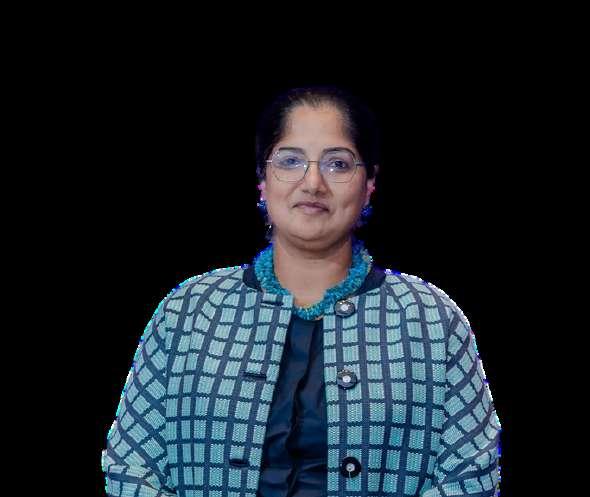
Program Manager
Australian Aid (AusAid)
escribing the strong ties between Australia and Nepal, citing factors ons, trade, and investment. She elaborated on the recent trade and investment framework signed during the seventh Indian Ocean Conference by the foreign ministers of both nations. She also acknowledged Australia's heightened interest in the security, development, and prosperity of the region, particularly affecting the Himalayan region, evidenced by the rising number of ministerial and high-level visits from Australia to Nepal.
Furthermore, Kasynathan shared the imperative of bolstering transboundary cooperation, noting weak regional organization in South Asia. She provided insight on Australia's support through initiatives such as capacitybuilding programs for sub-national governments in Nepal, ecological conservation efforts in collaboration with ICIMOD, and the establishment of a community-based flood warning system. Additionally, she noted that Australia has been actively backing various projects under regional frameworks like the South Asia Regional Infrastructure Connectivity (SARIC) initiative.
Australia has a strong interest in the region, and is working in partnership to respond to emerging developmental challenges including those that affect the Himalayan community.

Kasyanthan iterated Australia's commitment to promoting gender equality and inclusion, recognizing the heightened vulnerability of women in Himalayan communities. She concluded by identifying the common challenges faced in the Himalayan region, underscoring the critical importance of regional cooperation initiatives to address these issues effectively.

For the session, Phanindra Adhikary delivered a presentation aligning Nepal's journey with federalism and its potential implications for fostering climate-resilient actions. He commenced by elucidating the key provisions of Nepal's 2015 constitution, emphasizing principles such as egalitarianism, the decentralized structure of governance across three tiers, and the allocation of power and resources concerning environmental distress. Adhikary pointed out the susceptibility of Nepal's egalitarian aspirations to the threats posed by climate change
Transitioning into an examination of the progress and application of federalism in Nepal, particularly in sectors like healthcare, education, and infrastructure, Adhikary featured the critical role of democratic decision-making processes at the local level and the necessity of inclusive, collective, consensus-driven, and evidence-based approaches to policymaking for the implementation of climate-resilient projects and programs.
Furthermore, Adhikary identified the need to align political and economic incentives to bolster participation in regional integration efforts among countries and stakeholders. In conclusion, he expressed optimism for collaborative initiatives stemming from the Himalayan Future Forum, envisaging a platform for joint efforts towards regional integration and resilience-building in the face of climate change.
The more stakeholders work with subnational and local governments, the easier it is to mitigate the effects of climate change.



Saroj Kushwaha discussed Nepal's cultural and creative industry alongside UNESCO's involvement in integrating youth into local municipalities. He addressed UNESCO's global initiative, the Creative Cities Network, which has been active since 2004, aiming to foster creativity in cities worldwide. Excitingly, Kathmandu was nominated as a Creative City of Film, with Kathmandu Metropolitan City (KMC) implementing a comprehensive four-year action plan focusing on infrastructure, education, exhibitions, and policy development
Kushawaha stated the objectives of the network encompassing international cooperation, cultural and creative economy stimulation, innovation, and integrating culture into development plans for which the seven creative fields, including crafts, design, film, gastronomy, literature, media arts, and music could be capitalized. Additionally, with urbanization projected to increase significantly by 2050 and SDG Goal 11 focusing on sustainable cities, he informed that the local governments have incorporated culture and creativity into their pandemic response strategies.
Supporting Nepal's creative and cultural sectors empowers youth and marginalized communities, contributing significantly to the local economy.

Futhermore, Kushwahamentioned sharing his collaboration experience with the Ministry of Industry, Commerce and Supplies to establish a framework supporting Nepal's creative industry. He pointed out the necessity of promoting small and medium-sized enterprises mobilizing the marginalized communities, within the creative sector. In relation to this, he noted the prevalent misconception limiting Nepal's creative industry to handicrafts.

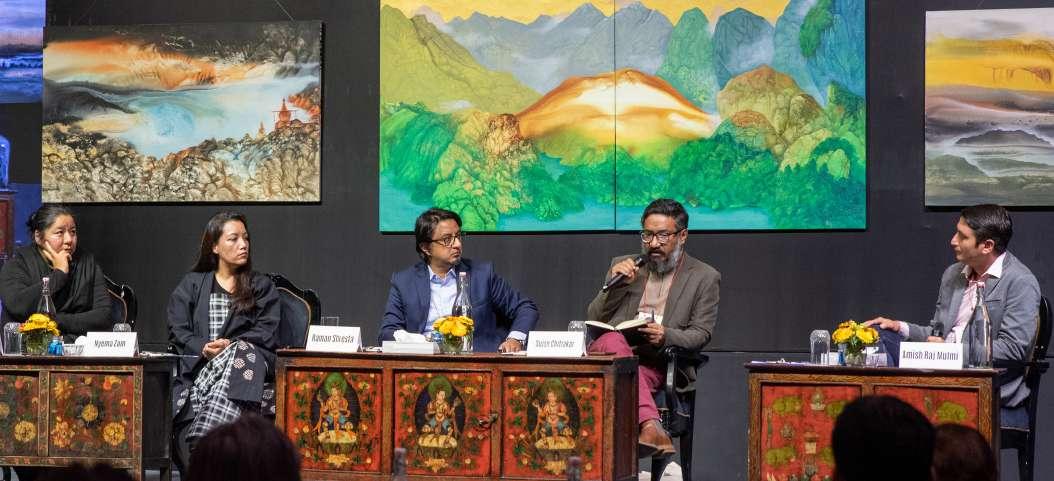
This session delved into the untold stories and rich heritage of the Himalayas. Joined by speakers representing various facets of the arts, academia, publishing, and media, the session aimed to amplify Himalayan voices, urge the audience to rethink their perspectives, and embrace the extraordinary stories that often remain hidden from the mainstream. Through insightful reflections, the speakers underscored the impact of art, culture, and indigenous knowledge in shaping societal discourse, fostering environmental consciousness, and empowering communities. As the session unfolded, it became evident that the Himalayan region holds a wealth of untapped potential, waiting to be unearthed, and celebrated on the global stage.


on by advocating for the recognition of the extraordinary stories parallels between popular culture and Nepalese history, Mulmi age that often is overlooked in mainstream narratives on the global erspectives on art and broaden its definition by including indigenous

He noted that visual arts effectively communicates the Himalayas' fragility and the need for its conservation. He also underscored the agency of Himalayan communities in reclaiming their narratives and the transformative potential of storytelling in fostering cross-cultural understanding and environmental consciousness. Quoting director Bong Joon-ho, Mulmi concluded with a powerful reminder, “Don’t let 1-inch-tall subtitles stop you from experiencing world cinema.”
Guiding questions for the Session:
1
How is Himalayan storytelling evolving through digital platforms and how can these mediums ensure the representation of marginalized narratives?
2.
What are the barriers preventing Himalayan stories from reaching broader audiences and how can new media collaborations address these challenges?
3.
How is technology giving new momentum to Himalayan creatives in amplifying their voices and fostering cross-cultural understanding?
Co-Founder and Director photo.circle
NayanTara Gurung Kakshapati delved into society's perception than mere aesthetic pursuits. She underscored their significan reflection of complex societal issues. Kakshapati prompted a both individually and collectively, to tackle these challenges effe
Drawing attention to the concept of time and scale, Kakshapa approach issues from a perspective of quick time or deep ti growth and formation with the urgent timeframes typically a change. For instance, she discussed the "Sovereign Forest" , p y q industrial mining in Odisha and how such losses extend beyond the physical realm to encompass knowledge systems, culture, and societal fabric.
Throughout the discussion, Kakshapati raised crucial questions about the language, choice, and scale of storytelling. Storytelling can be a powerful tool to tailor narratives for diverse audiences, reevaluate development's true cost, and reflect the multifaceted nature of societal dynamics. Her emphasis on cultivating empathy for building a deeper connection to the world served as a poignant reminder of the collective responsibility we bear in shaping a more sustainable future.
We understand the world around us through stories and narratives that we receive. If we are a community of storytellers, what are the stories that we are choosing to tell?





with a simple question, “How many of you have tried Ramyeon or ean cultural elements, she highlighted the soft power of films in ories to tell that the world has not seen before. Noting the missed potential, she underscored the richness of Himalayan folklore and with a growing global appetite for foreign films
an’s "Mountain Man” being shortlisted for Oscars and Nepal's stival as evidence of the potential for globally compelling content d the potential to broaden the audience for Himalayan cinema by uages. Moreover, lack of engagement from their own communities eam audiences
People are looking for something that they can connect to and relate to. That’s why, there is that space for content that’s our own.
OTT) platforms and digital technology on democratizing content. She called for supportive policies to strengthen local content creation, particularly in terms of improving film financing mechanisms, organizing forums that bring filmmakers across the region together, and facilitating seamless cross-border digital payments Zam concluded by celebrating the transformative capabilities of digital technology, which provides valuable consumer insights and enables the creation of tailored content that caters to the evolving preferences of global audiences.
Raman Shresta reflected on his journey from a bookseller to an inn-keeper and p challenges and opportunities presented by the region's distinct geo-cultural la years ago, when the region was often misunderstood with Sikkim being confused with Sikhism and Gangtok with Guwahati. Recognizing the gap in research not reaching back to the communities it was based on, Shresta was inspired to venture into the line of publishing with a focus on bringing local narratives to the forefront
Shresta likened the publishing industry to an ecosystem, with booksellers serving as vital bioindicators of biodiversity. Booksellers help understand the pulse of readers and bridge the gap between writers and readers. Contrary to popular belief, he suggested that the biggest challenge for booksellers lies not in competing with online bookstores but rather in navigating the dynamics of the publishing industry itself.
Discussing contemporary literary trends, Shresta also observed the growing importance of urban spaces as backdrops for a surge in writings exploring themes of migration, diaspora, gender issues, and other regional experiences. He further reiterated the significance of ongoing churning in writing and the proliferation of such writing in shaping the evolving landscape of regional literature. Finally, Shresta showcased the transformative potential of publishing in amplifying marginalized voices as well as the power of literature in fostering inclusive dialogue
Let’s consider the publishing industry as an ecosystem. A bookseller is like the biodiversity bioindicator as the books jump from our hands into the readers’.




r shifting towards a more localized perspective on art, culture, and literature by e with the expertise among Nepali youths. Critiquing the prevailing Westerned the need to embrace diverse knowledge systems and foster a more inclusive dialogue within the art community. He underscored the intergenerational nature of Nepal's knowledge system and called for redesigning learning opportunities to incorporate the wisdom of local artisans
Chitrakar emphasized the importance of recognizing traditional knowledge systems and moving away from the tendency to dismiss them as mere "superstition." Acknowledging the influence of Western academia in Nepali universities, he highlighted initiatives to integrate local knowledge, indigenous heritage, and circular economy principles into the curriculum at Kathmandu University. Furthermore, he noted the efforts underway to revamp programs like the Bachelor of Arts and Design, so that they adapt to climate change and align with sustainable practices.

We need to look into our youths for the future and help them understand that knowledge lies in ourselves and be inspired by our land.
Chitrakar proposed bringing in both Nepali and international curators to explore knowledge systems on a broader regional scale and deepen collaboration among the younger generations for sustainable development He stressed the importance of empowering youths to recognize the wealth of knowledge within themselves and to contribute meaningfully to their communities and society at large.
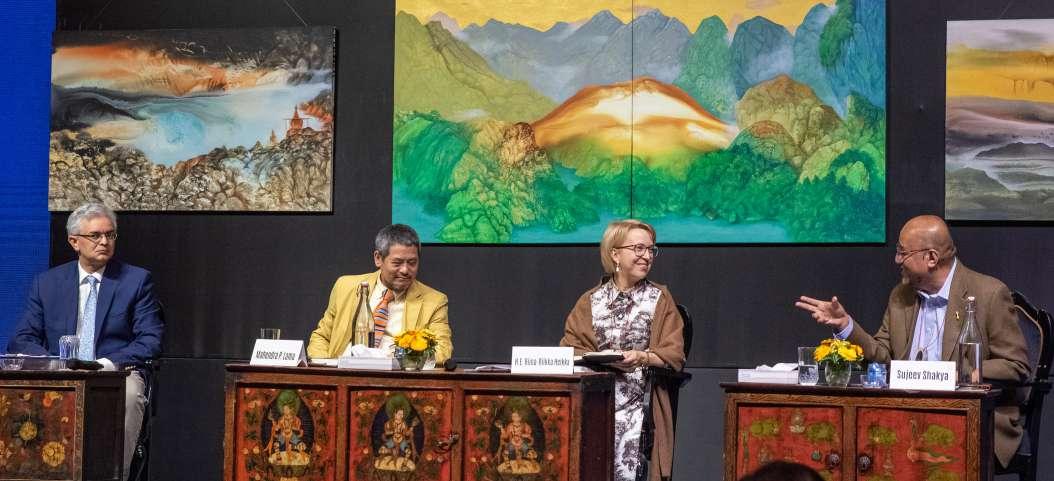
The Closing Plenary of the Himalayan Future Forum marked the culmination of two days of diverse perspectives on climate, connectivity, and community. Led by a diverse panel composed of esteemed thought leaders, climate scientists, ambassadors, and professors, the session synthesized key themes, insights, and opportunities for the future of the Himalayan region. The session served as a springboard for collective action, such as integrating indigenous knowledge, fostering inclusive dialogues, and empowering youth, to steer the trajectory of the Himalayan Future Forum towards a sustainable future.



Arnico Panday provided a comprehensive overview of the Himalayan Future Forum (HFF) while discussing its initial vision, coverage of sessions, omissions, and way forward. Panday emphasized the importance of understanding the Himalayan region not only as a geographical topography but also as a diverse cultural landscape capable of hosting dialogues, fostering friendships, and discovering common solutions to shared problems.
By urging the audience to think of the people not in the room or the issues not covered, Panday pondered over redefining the Himalayan region beyond BBIN to encompass all territories influenced by the Himalayan ecosystem and incorporate perspectives from neighboring countries like Pakistan and China. Panday called for enhanced connectivity to promote regional integration through people-to-people ties and physical infrastructure, such as electric railway connectivity that substitutes long-haul aviation. He also identified other common challenges confronting the Himalayan region, including climate change, cascading disasters, conflict, COVID-19, corruption, outmigration, air pollution, religious fundamentalism, and increasing intolerance for diverse views.

We had a lot of brainstorming sessions since last year to figure out what could be some of the outcomes of HFF.
Drawing parallels with the story of two brothers on an island, he highlighted that negotiations be focused on finding win-win solutions that benefit all stakeholders involved. He urged evaluation of the forum based on tangible results, rather than merely the number of meetings held, and the realization of ideas discussed. Given the daunting challenges ahead, Panday emphasized the role of HFF where regional youth collaborate to sow the seeds of ideas that can be cultivated to shape a better future for the Himalayan region.
Senior Professor
Jawaharlal Nehru University

Mahendra P. Lama offered insightful recommendations and reflections on the c g the Himalayan region. First, he emphasized the need for mechanisms to ensure the transmission of Himalayan resources and knowledge to future generations, suggesting tools like oral history documentation, conservation efforts, and institutionalization. Second, he raised concerns about the increasing trend of resource nationalism in the Himalayas, which hinders collaboration and exacerbates conflicts over resources He urged for renegotiation and collaboration tools to address this issue, including through the platform of the HFF.
Third, Lama proposed leveraging great power rivalries to promote cooperation and transform hard borders into soft borders in the Himalayan region. He emphasized the importance of activities that result in win-win situations for communities across borders. Fourth, he stressed the significance of sharing stories from the region, such as the contrast between slow food in the mountains and fast food in the West, to promote understanding and reverse global trends. He shared examples of successful initiatives, like the comparison of local and global human development reports in Sikkim, to illustrate the potential impact of sharing stories.

It’s HFF’s responsibility to take the mountain people and the communities in the mountain region out from the bora (sack)
Lastly, he underscored the responsibility of the HFF to uplift mountain communities from restrictive narratives and empower them to shape their future. He metaphorically described the plight of mountain communities, likening their situation to being confined in successively smaller containers like the nanglo, doko, thunche, and ultimately leading to a suffocating bora He emphasized the need to liberate the mountain people from such constraints.



Ambassador Riina Rikka Hekka shared insights into the transformative power of storytelling, the necessity of fostering diverse partnerships, and the imperative of youth engagement for charting a sustainable and inclusive path forward in the Himalayan region. She lauded the organizers for fostering enriching discussions and encouraged ongoing youth involvement in future forums.Moreover,sheunderscoredtheintrinsicpowerofstorytelling,notingthatwhilestoriesoftenaimforaspecificoutcome theprocessitselfholdssignificantvaluebeyondjusttheoutcome.
In discussing partnerships, Amb Hekka emphasized the need to think creatively and beyond conventional frameworks She highlighted the diverse perspectives shared throughout the forum, emphasizing the capacity of storytelling to bridge gaps, inspire empathy, and foster understanding. She emphasized the value of community and challenged participants to consider innovative approaches to collaboration Emphasizing that there is no one-size-fits-all approach to partnerships, she urged participantstofocusonthinkingoutsidetheboxtowardsharedgoals,trust,andcommitment.
Turning her attention to youth engagement, Amb. Hekka stressed the importance of involving young voices in decision-making processes.SheprovidedanexampleoftheEuropeanUnion'sYouthSoundingBoardasameaningfulyouthengagementand called for greater efforts to include young people in discussions and forums. She concluded her reflections by offering youth representatives the space to voice their perspectives on the event. While youth representatives expressed gratitude for their inclusion in such a pertinent forum, they also highlighted the need for greater accessibility in discussions, greater youth representation on panels, and increased involvement of government agencies.
We have discussed many elements of partnerships and there's no one-sizefits-all. But what I challenge us all to focus on is thinking out of the box.
Sujeev Shakya reflected on the genesis of the Himalayan Future Fo sustainability. Despite the challenges posed by the COVID-19 pa fruition and the team's dedication to institutionalizing foundationa comprises individuals under 40 and 40% of women. However, c representation from certain Himalayan countries like Pakistan and and challenges in engaging government agencies due to protocol-d
Building upon insights from the forum, Shakya ideated a roadmap for future HFFs. In addition to climate, community, and connectivity, he proposed broadening inclusivity by embracing three other “C” dimensions: common story, conversations, and cushion. He suggested incorporating multiple languages, such as Tamang, Newari, and Dzongkha, within the same panel with simultaneous translations for wider reach, diversity, and representation. Furthermore, he highlighted the importance of engaging moderators and speakers to connect effectively with the audience, especially young people.
Shak instit
Whenever there is geopolitical stress, there are opportunities. Perhaps, the HFF has a tremendous opportunity to engage in that group.
tens forge boun
stakeholders for their contributions to the success of HFF 2024, revealing proposed collaborations within the BBIN circle, including Sikkim, Dhaka, and Thimphu, and inviting greater participation in the second HFF scheduled for February 21-22, 2025 in Kathmandu, Nepal.





Nepal Economic Forum (NEF) is an impact-driven research institution that has played a pivotal role in redefining the development narrative in the region. NEF has served as the secretariat to the Himalayan Consensus Summit (2016-19) and independently organized the Himalayan Circular Economy Forum (HiCEF) in 2020 to promote sustainable production and consumption in the Himalayan region. Additionally, the organization has a charity equivalence certification for the US, registered through NGO Source.
OUR PARTNERS



INTERNET PARTNER



SUPPORTERS OF THE EVENT









Partners and Supporters

DESIGN THEME
Pavitra Tuladhar
ART
COORDINATORS
Swosti Rajbhandary Kayastha
NayanTara Gurung Kakshapati
HFF TEAM
Convenor: Sujeev Shakya
Coordinator: Nasala Prajapati
Anushka Shrestha
Sukeerti Shrestha
Suyasha Shakya
HFF SUPPORT TEAM
Adhish K Gorkhali
Ajay Khadgi
Alpa B. Shakya
Ayusha Kunwar
Bam Bahadur Jirel
Bibhuti Kharel
Chandani Thapa
Mahotsav Pradhan
Manika Maharjan
Padam Bajracharya
Padma T. Magar
Prakriti Adhikary
Rojesh Bhakta Shrestha
Raju Dhan Tuladhar
Sanjit Tuladhar
Sagar Jung Karki
Sonam Dolkar Bhutia
Shuvangi Shrestha
Sudiksha Tuladhar
Suhan Shakya
Urja Gautam









Government of Nepal
Alternative Energy Promotion Centre














Government of Nepal
Ministry of Agriculture and Livestock Development






























